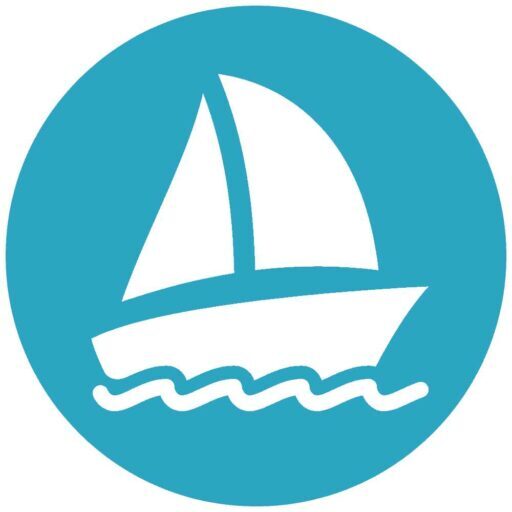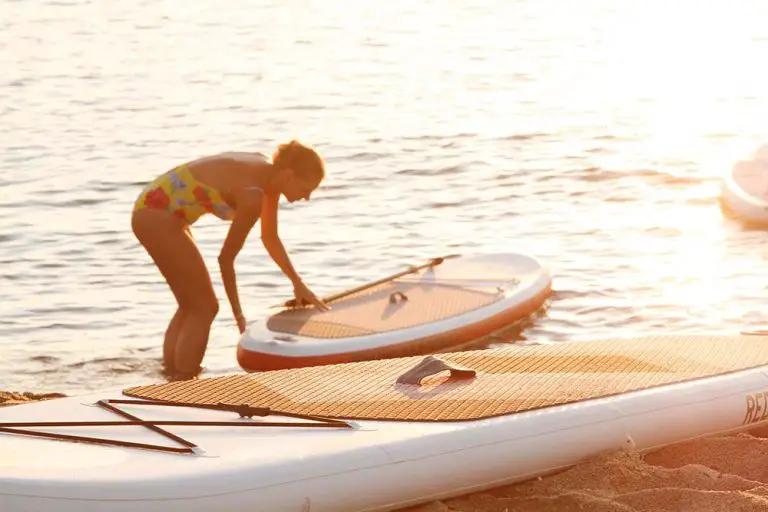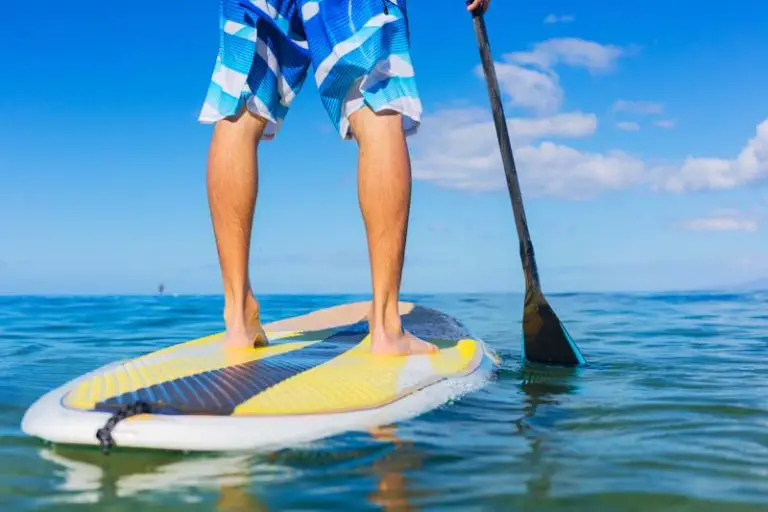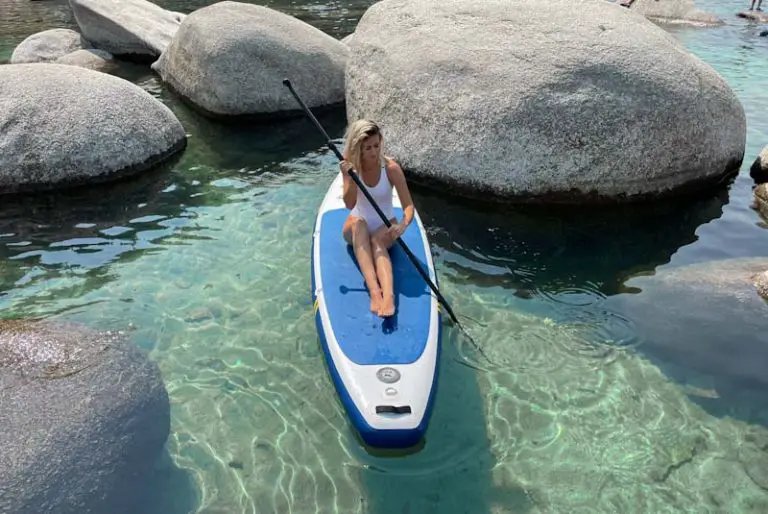Is Paddle Boarding Difficult to Learn? (We Find Out!)
You’ve probably heard of paddleboarding or SUP (stand-up paddleboarding). It has become one of the most popular water sports over the last decade. It looks so easy when you see someone gliding over the surface of the water, but is paddle boarding difficult to learn?
Paddle boarding is a very easy water sport to learn. You can learn to paddle board with just a few hours of practice and/or instruction. The key to learning to paddleboard easily is to begin in very calm water. As you get the hang of paddleboarding, you will be able to handle it when the water gets more choppy.

Paddleboarding is Easy to Learn
Children and adults can quickly learn the basics of paddle boarding in just a few minutes.
It usually only takes about 10 minutes for beginners to stand up on their paddleboard for the first time. Anybody comfortable being in the water can master a paddle board fast.
Paddleboarding is also a great starting point for people who want to learn to surf as some of the same skills, such as balance, are used in each sport. Paddleboarding is a water sport that usually takes place in areas with small waves or calm waters.
Is It Easy To Fall Off A Paddle Board?
It’s inevitable that you will fall off your paddleboard eventually. Even professional paddlers fall off their boards from time to time. So don’t worry about falling off when you first try a paddle board.
This might lead you to wonder if paddleboarding is dangerous?
Research conducted in 2020 shows that there are usually four reasons for board paddling injuries. The first is caused by directly hitting an object. The second is physical strain due to the wrong body position. Third are overuse injuries, and lastly are injuries caused by the environment. (Source)
If you go into this sport being tense and nervous, it’s more likely for you to fall off your paddleboard.
Remember that you will also have a paddle that can help you balance on the board. Not only can you use the paddle to propel you forward, but it can also be used to keep you balanced.
Is It Hard To Balance On A Paddle Board?
It is not hard to balance on a paddleboard if you have the right equipment. Consider your height and weight when picking out the paddleboard you will use.
It will be hard to balance on a paddleboard if you have a board that is too small for your size. Also, the longer and wider your paddleboard is, the larger platform you’ll have to stand on which will decrease your chances of falling.
How Should A Beginner Stand Up Paddle Board?
1. Get the proper gear for your height and weight. Choose a board that is not too small for your size. The bigger the paddling board, the more stable it is on the water.
2. Look for a conducive space to practice. It’s better to practice where the water is not too deep so you can get started standing up.
3. Get on your knees first. It is the first step in finding your balance to stand up on your paddleboard. Remember to do this while you are right in the middle of the board.
Pay attention to the nose and tail of the board. If the nose is sinking it means you’re too far forward and if the tail is sinking it means you are positioned too far back. Paying attention to this will help you find the equilibrium point of your board.
4. Start standing up. You can start standing up once you’ve mastered being on your knees. Slowly move your feet to where your knees are to stand up.
Stand up but keep your knees slightly bent as if you’re going into a squat position. This position will help you adjust your balance as needed.
5. Keep paddling. As soon as you start standing up, start paddling slowly to find the right balance. Use your paddle to your advantage.
Is Paddle Boarding Hard For Oversized People?
One of the reasons paddleboarding became so popular is because it’s easy to do. It can be a great physical fitness program and hobby to get into.
People who are overweight are known to lose at least 2% of their body fat after just a short period of paddleboarding. As a person’s core muscles get more active, fat around the intestinal area may lessen as well. (Source)
Overweight people can get into paddleboarding for both reasons – hobby and exercise. At first, it can be challenging to stay on the board. But if you have the right paddleboard and paddle, it will get easier for you quickly.
Paddle Boarding is a Mentally And Physically Rewarding Activity
A study conducted in 2016 focused on the physiological, musculoskeletal, and psychological effects of paddleboarding.
They studied 13 participants for six weeks and found an increase in the quality of life for all the participants by at least 9.95%. (Source)
This water sport is a great way to simultaneously work out and have fun. Just the simple act of standing up on a paddle board is a cardiovascular workout.
It effectively decreases your chances of acquiring severe health issues like arthritis and stroke.
Ultimately, paddle boarding can lower your psychological stress levels too. Your brain releases endorphins and other stress-releasing signals to your body when you get physically active.
Paddleboarding is a fun way to stay mentally and physically healthy.
Paddleboard vs Surfboard (What’s The Difference?)
By comparing the boards used for surfing and paddle boarding, you can easily distinguish which one is for which activity. Paddle boards are much longer. Usually, a paddleboard measures about 14 feet long and is much wider and heavier than a surfboard.
Attempting to paddle board on a surfboard would be nearly impossible due to its shorter length. A surfboard is not designed to have someone stand on it without moving at a good speed while you can comfortably stand on a paddleboard without moving at all.
In addition, surfers use their arms to paddle when surfing, while one uses a long paddle to move with a paddleboard.
Sources:
- Schram, Ben & Furness, James “Exploring The Utilisation of Stand Up Paddle Boarding in Australia” Accessed May 2022.
- Schram, Ben, Hing, Wayne A. & Climstein, Michael “The Long-term Effects of Stand-up Paddle Boarding” Accessed May 2022.
- Spittler, Jack MD., Gillum, Ryan MD. & DeSanto, Kristen MSLS “Common Injuries in Whitewater Rafting, Kayaking, Canoeing, and Stand-Up Paddle Boarding” Accessed May 2022.
- Schram, Ben, Hing, Wayne & Climstein, Mike “The physiological, musculoskeletal and psychological effects of stand up paddleboarding” Accessed May 2022.



